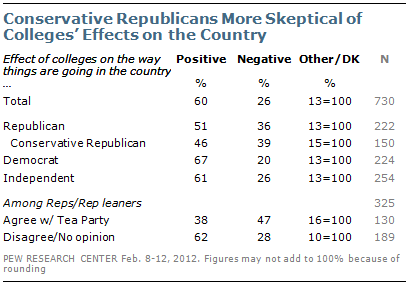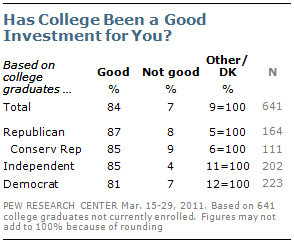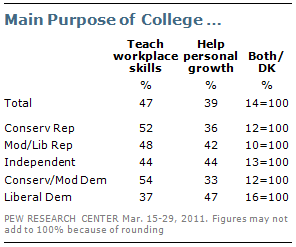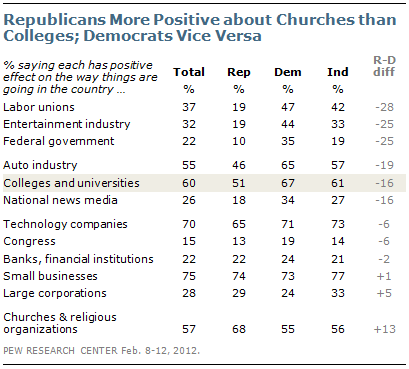Americans generally think that colleges and universities have a positive impact on the country, and an overwhelming majority of college graduates say higher education is worth the investment. However, conservative Republicans are skeptical of colleges’ effects on the country, even though most who have completed college view the experience as personally beneficial.
In the latest survey by the Pew Research Center for the People & the Press, conducted Feb. 8-12 among 1,501 adults, 60% said that colleges have a positive effect on the way things are

going in the country; just 26% said they have a negative effect. Of a list of 12 institutions and industries, only small businesses (75% positive effect) and technology companies (70%) were viewed more positively.
However, just 46% of conservative Republicans said colleges and universities have a positive impact, while nearly as many (39%) said they have a negative effect. By wide margins, Democrats (67% to 20%) and independents (61% to 26%) said colleges and universities have a positive impact.
There were substantial differences among Republicans and Republican-leaning independents in opinions about the effects of colleges and universities: Just 38% of those who agree with the Tea Party viewed their impact positively; that compared with 62% of Republicans and leaners who do not agree with the Tea Party.

Nonetheless, conservative Republicans who have graduated from college are as likely as those in other political groups to have a positive view of the personal impact of a college education. In a survey conducted in March 2011 by Pew Social & Demographic Trends, 85% of conservative Republicans said that college had been a good investment for them personally. That was little different from the percentages of independent (85%) and Democratic (81%) college graduates who viewed college as a good investment.
That survey found relatively modest partisan and ideological differences in opinions about whether a college education is important for young people to succeed, the affordability of college, and whether the higher education system provides a good value for students and their families. (For more from this survey, see “Is College Worth It?”May 15, 2011.)
Moreover, virtually all parents across the political and ideological spectrum said they expected their own children to go to college: 99% of Republicans said this, as did 96% of Democrats and 93% of independents.

But conservative Republicans and liberal Democrats differed about the main purpose of college: 52% of conservative Republicans said the main purpose of college should be to teach specific skills and knowledge that can be used in the workplace, while 36% said its purpose should be to help an individual grow personally and intellectually.
Liberal Democrats were more likely than conservative Republicans to say college should mainly help people grow personally and intellectually (47%). About four-in-ten liberals (37%) said college’s main purpose should be workplace training. On this issue, the views of conservative and moderate Democrats were closer to those of conservative Republicans than to liberal Democrats (54% training vs. 33% personal growth).
Partisan Differences in Views of Institutions
The survey released last month found substantial partisan differences in views of the effects of several institutions, aside from colleges and universities.

Just 19% of Republicans said labor unions have a positive effect on the way things are going in the country; more than twice as many Democrats (47%) and independents (42%) viewed unions’ impact positively.
The differences were about as large in positive opinions about the impact of the entertainment industry and the federal government (25 points each).
Among the 12 institutions and industries included in the survey, there was only one – churches and religious organizations – that Republicans rated more positively than did Democrats. About two-thirds of Republicans (68%) said churches have a positive effect on the way things are going in the country, compared with 55% of Democrats. Republicans expressed more positive views about the impact of churches than colleges (68% vs. 51%), while Democrats were more positive about the effects of colleges (67% vs. 55%).
Among Republicans and Republican leaners who agree with the Tea Party, fully 78% said churches have a positive effect on the way things are going in the country, about double the percentage saying that colleges and universities have a positive impact (38%). Among liberal Democrats and Democratic leaners, the gap was about as wide in the other direction: 74% said colleges have a positive impact compared with 38% who viewed the effect of churches and religious institutions positively.




